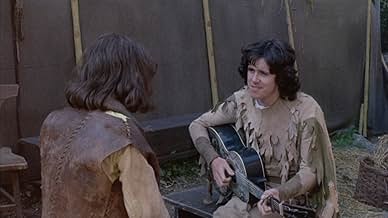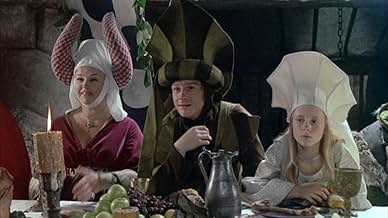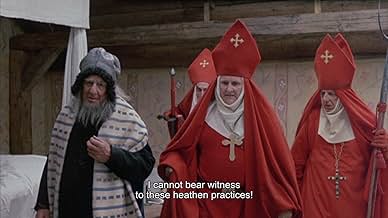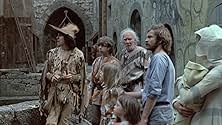In 1349, while the Black Plague threatens Germany, a troupe of acrobats and musicians arrives in the town of Hamelin a few days before the mayor's daughter's wedding.In 1349, while the Black Plague threatens Germany, a troupe of acrobats and musicians arrives in the town of Hamelin a few days before the mayor's daughter's wedding.In 1349, while the Black Plague threatens Germany, a troupe of acrobats and musicians arrives in the town of Hamelin a few days before the mayor's daughter's wedding.
Featured reviews
Grimm Brothers tale of a strolling minstrel in 1349 Germany who agrees to rid the village of Hamelin of plague-carrying rats is given a serious, perhaps overly-solemn treatment. Jacques Demy has directed the story in a straightforward fashion, without any humor or playfulness, mystery or beauty (with the exception of the sunrise-heightened finale). Pop singer Donovan is well-cast in the title role, and his music compositions are good even if his songs are not of the Medieval period. The other cast members--top-billed Jack Wild, Donald Pleasance and John Hurt--have very little to do; Wild, in particular, is forced to painfully hobble around with a crutch as an alchemist's assistant. Michael Hordern as Melius, who is unable to conjure a cure for the Black Death and is arrested for being a heretic, gives the picture's finest performance, though his final moment tied to a stake may prove to be too heavy for the movie's supposed 'family audience.' The dank, mildewy locations, period costumes and bedraggled extras all lend a convincing air to the film, but "Piper"'s downbeat nature (not to mention all those rats!) makes it a tough sell. ** from ****
Back when I was a (allegedly disturbed) young child, "The Pied Piper of Hamelin" was my absolute favorite fairy-tale. I owned many tapes that were filled with bedtime stories and fairy-tales, but I mostly just listened to "The Pied Piper" because it featured fascinatingly morbid topics like the black plague, child abduction, rat infestations and a mysteriously sinister guy playing the flute. I was always convinced the premise of Robert Browning's eerie poem could form the basis of a series of unimaginably dark horror movies, but unfortunately there aren't that many. This British production, filmed on location in Germany, is a pretty great version but it's incredibly obscure for some reason and I spent an awful long time purchasing a decent copy. Now that I finally own it, I'm both thrilled about re-experiencing the familiar story lines as well as surprised about discovering entirely new story aspects I wasn't even aware of. The new (to me, at least) elements mostly handle about political and religious hypocrisy, so I presume that is the reason why they weren't included in any of the fairy-tale versions I grew up with. But it remains a fascinating story and a fabulously engaging film, only suffering from obvious and regrettable budget restrictions. Director and co-writer Jacques Demy had a clear and personal vision of the story, and it's definitely not a movie for young children to watch. Although never graphic or repulsive, "The Pied Piper" thrives on a disturbing atmosphere and it never evades any controversial themes, like the abuse of political power by the Catholic Church and the arranged marriages with minors. Donovan is excellent as the Piper, passing through Hamelin with a family of traveling circus artists. The burgomaster and the Baron (another splendid role for versatile super-actor Donald Pleasance) supposedly run the secluded little town, but they mainly obey the will of the uncanny red monks that always look over their shoulders. The friendly Jewish alchemist Melius is concerned about a threatening outbreak of the Bubonic plague, the power-hungry son of the Baron (John Hurt) is about to wed the under-aged burgomaster's daughter for financial reasons and the Pied Piper is the only person capable of freeing the town from its rat infestation. The script of this film is well filled and requires your absolute full attention, but the elaboration of the different story lines is highly compelling and the dialogs are enchanting. The costume designs and scenery are terrific and genuinely take you back to the dark and unsettling medieval times. Donovan, primarily a singer, also provides the film with a couple of great songs (most notably "They Call me the Pied Piper" and "Life has its ups and downs") and there are at least two near-brilliant and unforgettable sequences. Namely the rats breaking out of the wedding cake and a harrowing execution scene near the end. If you own "The Pied Piper", it's definitely a film to treasure.
The original 303-line poem "The Pied Piper of Hamelin" was published by Robert Browning in 1842, and wow it's a doozy--thoroughly disturbing to the core and meant to be so. How we ended up with a cute bedtime fable is beyond me, but then again, in the original Sleeping Beauty, the Prince rapes her in her sleep. So.
Here in 1972, we get an excellent adaptation of the tale which retains much of the poem's disturbing nature but with a slightly softened tone, offering glimmers of goodness and hope despite the backdrop of 13th Century inhumanity, greed, religious murders and child marriages. Yea, did I mention this is not for kids?
What offsets the disturbing story is largely the wonderful performance and gentle voice of Donovan who plays the titular Piper. Whereas in the original poem the piper was sort of a mysterious opportunistic rogue, here we get a mysterious character who is more of a wise, savior figure. The songs he sings (written by Donovan) are not just beautiful to the ear, but the lyrics are tranquil and reassuring.
This contrasts brilliantly against the disturbing story which is about a small German village that is besieged not only by the plague but, even worse, besieged by a consortium of corrupt politicians, priests and landowners who would tax their own grandmother's false teeth. It gets even more disturbing as the plot revolves around a baron's shifty son who is preparing to wed an 11-year-old-girl so he can collect the dowry and fund his violent exploits, and all the while his father the baron is squeezing blood out of the villagers so he can build a cathedral in his own honor--much to the drooling approval of the local bishops. This is heavy stuff. This is not a children's fable. But it's a brilliantly done film.
Not only are the acting performances riveting, from Donald Pleasance as the tyrannical baron to John Hurt as his loathsome son to Michael Hordern as Melius the scholar who is the sole voice of reason, but the camera style is thoroughly engaging as it follows the action gracefully for long stretches without a cut. If you watch this film, notice how the camera moves through the scenery almost like a silent character in the film, and this draws us tighter into the drama in a voyeuristic way. The sets are enormous and authentic, and as I mentioned the music is first rate.
On a subtle note, the film also attempts to nudge history back toward the truth. In the original poem, as well as for centuries, it was commonly accepted and taught that rats were the cause of the Black Plague, but only in recent years have we learned that the plague was spread by people basically drinking water out of their own sewers (go figure). And in this adaptation, the rats are not shown to be the vile "vermin" which Robert Browning accused them of being, but instead they are shown to be more like symbolic warnings of what will befall man if man doesn't clean up his act.
There's a beautiful, sobering moment where the piper talks to a rat and says something like "I know you must treat each other much better than men treat each other" and that short scene summarizes the spirit of this film. Yes, it's disturbing, yes it shows the atrocities and cruelty that humans inflict upon each other, but there's a subtle undercurrent that tells us wisdom will eventually prevail. Will it? I dunno, nearly 50 years after the film's release we're still waiting.
Here in 1972, we get an excellent adaptation of the tale which retains much of the poem's disturbing nature but with a slightly softened tone, offering glimmers of goodness and hope despite the backdrop of 13th Century inhumanity, greed, religious murders and child marriages. Yea, did I mention this is not for kids?
What offsets the disturbing story is largely the wonderful performance and gentle voice of Donovan who plays the titular Piper. Whereas in the original poem the piper was sort of a mysterious opportunistic rogue, here we get a mysterious character who is more of a wise, savior figure. The songs he sings (written by Donovan) are not just beautiful to the ear, but the lyrics are tranquil and reassuring.
This contrasts brilliantly against the disturbing story which is about a small German village that is besieged not only by the plague but, even worse, besieged by a consortium of corrupt politicians, priests and landowners who would tax their own grandmother's false teeth. It gets even more disturbing as the plot revolves around a baron's shifty son who is preparing to wed an 11-year-old-girl so he can collect the dowry and fund his violent exploits, and all the while his father the baron is squeezing blood out of the villagers so he can build a cathedral in his own honor--much to the drooling approval of the local bishops. This is heavy stuff. This is not a children's fable. But it's a brilliantly done film.
Not only are the acting performances riveting, from Donald Pleasance as the tyrannical baron to John Hurt as his loathsome son to Michael Hordern as Melius the scholar who is the sole voice of reason, but the camera style is thoroughly engaging as it follows the action gracefully for long stretches without a cut. If you watch this film, notice how the camera moves through the scenery almost like a silent character in the film, and this draws us tighter into the drama in a voyeuristic way. The sets are enormous and authentic, and as I mentioned the music is first rate.
On a subtle note, the film also attempts to nudge history back toward the truth. In the original poem, as well as for centuries, it was commonly accepted and taught that rats were the cause of the Black Plague, but only in recent years have we learned that the plague was spread by people basically drinking water out of their own sewers (go figure). And in this adaptation, the rats are not shown to be the vile "vermin" which Robert Browning accused them of being, but instead they are shown to be more like symbolic warnings of what will befall man if man doesn't clean up his act.
There's a beautiful, sobering moment where the piper talks to a rat and says something like "I know you must treat each other much better than men treat each other" and that short scene summarizes the spirit of this film. Yes, it's disturbing, yes it shows the atrocities and cruelty that humans inflict upon each other, but there's a subtle undercurrent that tells us wisdom will eventually prevail. Will it? I dunno, nearly 50 years after the film's release we're still waiting.
The bubonic plague often began with the death of the rats before it spread to the people. This movie's version of the pied piper seems far closer to the origin of the story than anything else I've seen.
Donovan sings three songs :outside the wonderful "sailing homeward",he performs two ditties "I'm the pied piper" (obvious) and "life has her (!) ups and her downs".It was filmed on location in Germany
"The pied piper" ,like "Peau d'âne" which was released the year before, is a fairy tale ,but the mood is drastically different:I would say that "peau d'âne" is a movie for children that can appeal to adults,and "the pied piper" a movie for grown -ups which can appeal to children."Peau d'âne" is the bright Renaissance,with its châteaux de la Loire such as Chambord,and the forest and the country are not hostile,it's a providential world."The pied piper" is the dark Middle Ages;the beginning might have been influenced by Bergman's "the seventh seal":the wandering entertainers ,the plague ,the "sorcerer" ...The screen play is almost an original one:the famous legend lasts barely ten minutes ,the rest of the plot is completely new and extremely pertinent.
Two worlds clash in Demy's work: the world of Melius the jew,that of an embryonic science and a desire to explain the things and to react to them:he comes much too soon and anyway the Jews suffered persecutions in those troubled times too:think that Louis IX,King of France of the thirteenth century ,forced the jews to wear the "rouelle",a sinister ancestor of Hitler's yellow star.And he became Saint-Louis, canonized by the Catholic Church.
And there's the world of the bishops,sinister characters dressed in red,red as blood,who personify intolerance and ignorance :unlike Melius,they react to the bubonic plague by saying it's a God-sent ordeal,because men are sinners,they do not have to understand but they must be ready to repent and to mortify (self-flagellation).The wedding is revealing as well:listen to the bishop,the way he speaks to the bride:she is an impure human being,whose only way is to follow her husband's rule:till 1215,woman had no soul!
Demy expresses his disgust with the famous scene of the wedding cake: big rats appear,they had entered the cathedral-pastry.It won't be long before the magnificent dessert crumble .And it will not be long before Hamelin itself and its hypocrite priests crumble like Sodom .So the pied piper is like God's angel ,leading Lot out of this doomed place.The children are the just men,sometimes sacrified as Hurt's unfortunate bride ,a child herself -a girl used to get married at an early age in those ancient times.
Demy 's pessimism,which passed for melancholy in "Lola" , muted in "les parapluies de Cherbourg",seemed to disappear in "les demoiselles de Rochefort" and "peau d'âne", is glaring in "the pied piper".This is probably his darkest work.Thus ,one can forget his return to the ponderous comedy with Deneuve and Mastroianni in 1972".
"The pied piper" remains an overlooked,ignored work.How many Demy's fans do not even know that this film exists?I urge them to see it,it's an essential part of his work,and maybe his swansong,because he was never to reach such heights afterward.
"The pied piper" ,like "Peau d'âne" which was released the year before, is a fairy tale ,but the mood is drastically different:I would say that "peau d'âne" is a movie for children that can appeal to adults,and "the pied piper" a movie for grown -ups which can appeal to children."Peau d'âne" is the bright Renaissance,with its châteaux de la Loire such as Chambord,and the forest and the country are not hostile,it's a providential world."The pied piper" is the dark Middle Ages;the beginning might have been influenced by Bergman's "the seventh seal":the wandering entertainers ,the plague ,the "sorcerer" ...The screen play is almost an original one:the famous legend lasts barely ten minutes ,the rest of the plot is completely new and extremely pertinent.
Two worlds clash in Demy's work: the world of Melius the jew,that of an embryonic science and a desire to explain the things and to react to them:he comes much too soon and anyway the Jews suffered persecutions in those troubled times too:think that Louis IX,King of France of the thirteenth century ,forced the jews to wear the "rouelle",a sinister ancestor of Hitler's yellow star.And he became Saint-Louis, canonized by the Catholic Church.
And there's the world of the bishops,sinister characters dressed in red,red as blood,who personify intolerance and ignorance :unlike Melius,they react to the bubonic plague by saying it's a God-sent ordeal,because men are sinners,they do not have to understand but they must be ready to repent and to mortify (self-flagellation).The wedding is revealing as well:listen to the bishop,the way he speaks to the bride:she is an impure human being,whose only way is to follow her husband's rule:till 1215,woman had no soul!
Demy expresses his disgust with the famous scene of the wedding cake: big rats appear,they had entered the cathedral-pastry.It won't be long before the magnificent dessert crumble .And it will not be long before Hamelin itself and its hypocrite priests crumble like Sodom .So the pied piper is like God's angel ,leading Lot out of this doomed place.The children are the just men,sometimes sacrified as Hurt's unfortunate bride ,a child herself -a girl used to get married at an early age in those ancient times.
Demy 's pessimism,which passed for melancholy in "Lola" , muted in "les parapluies de Cherbourg",seemed to disappear in "les demoiselles de Rochefort" and "peau d'âne", is glaring in "the pied piper".This is probably his darkest work.Thus ,one can forget his return to the ponderous comedy with Deneuve and Mastroianni in 1972".
"The pied piper" remains an overlooked,ignored work.How many Demy's fans do not even know that this film exists?I urge them to see it,it's an essential part of his work,and maybe his swansong,because he was never to reach such heights afterward.
Did you know
- TriviaThe film was considered too dark for a children's film.
- ConnectionsFeatured in Jacquot of Nantes (1991)
- How long is The Pied Piper?Powered by Alexa
Details
- Release date
- Countries of origin
- Official site
- Languages
- Also known as
- Pied Piper of Hamlin
- Filming locations
- Production companies
- See more company credits at IMDbPro
Contribute to this page
Suggest an edit or add missing content
































